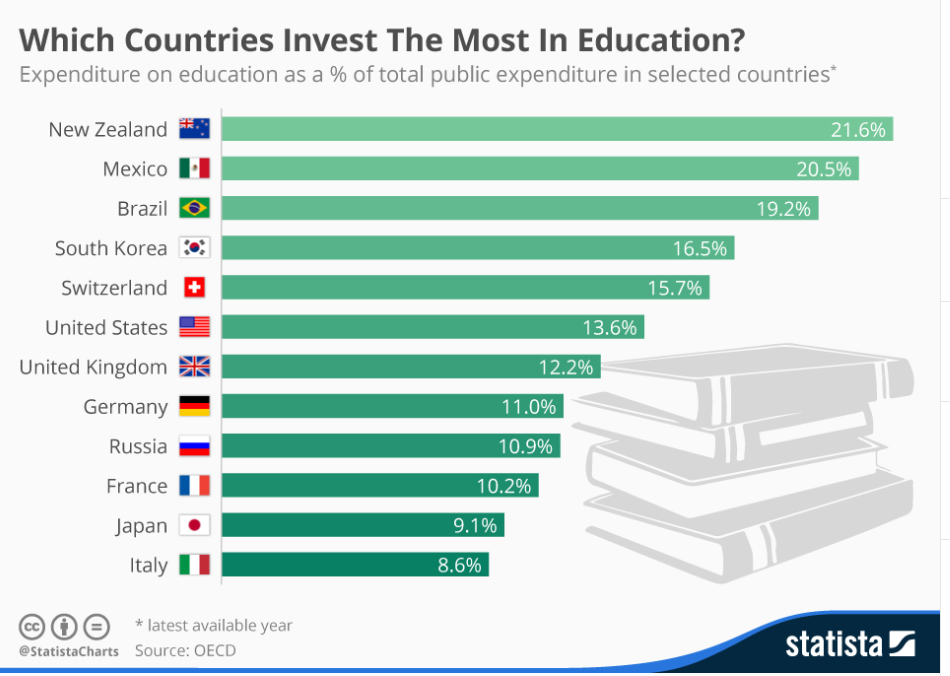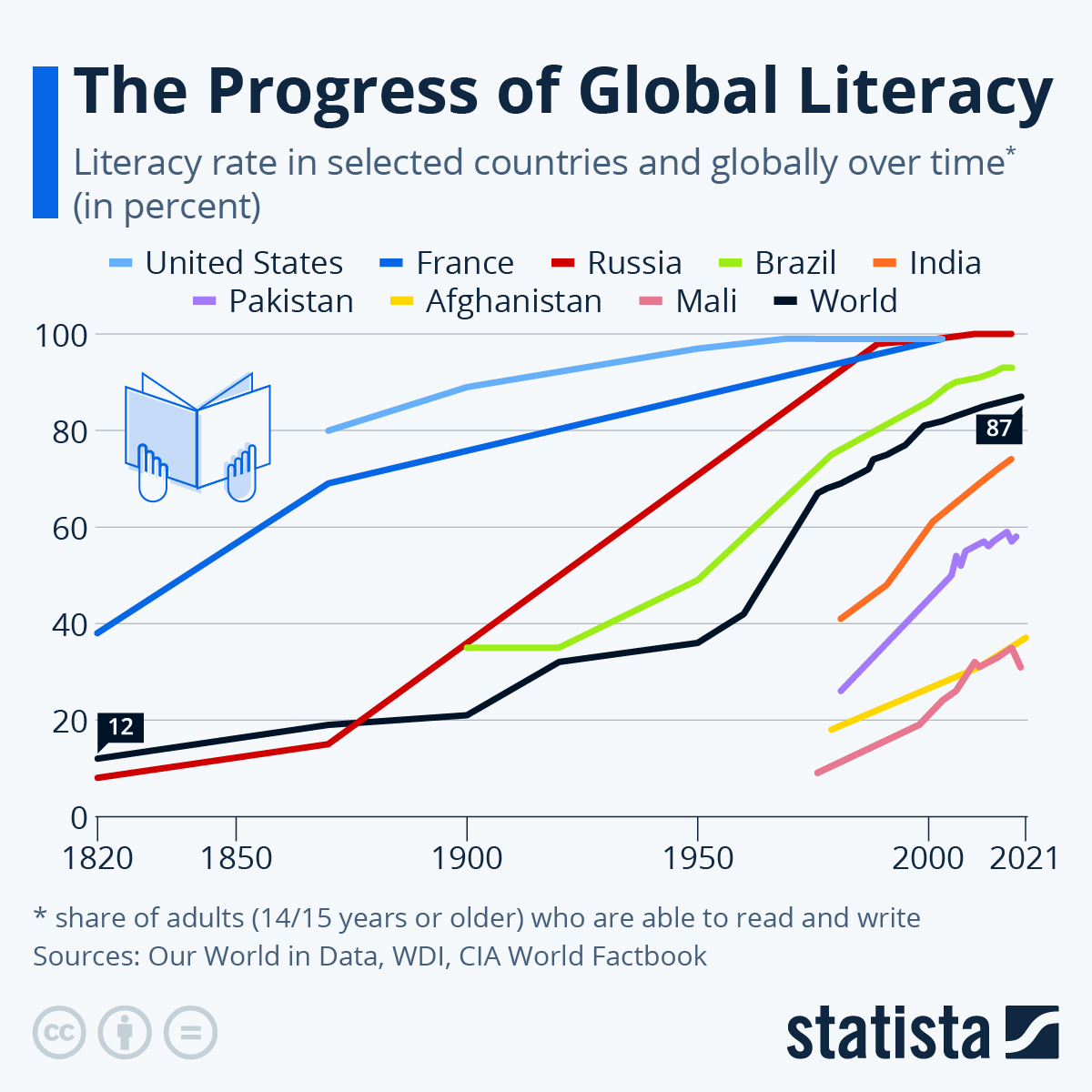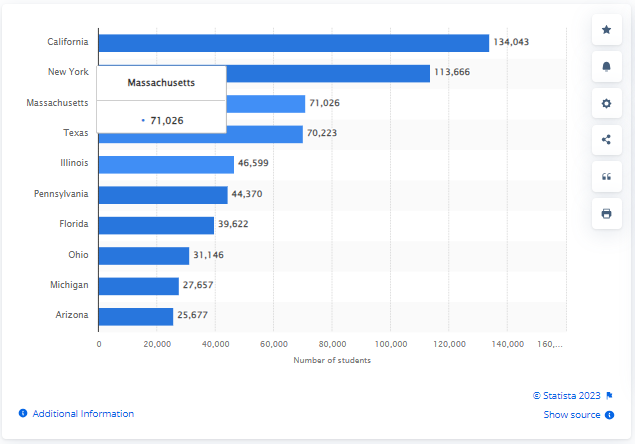Update: This article was last updated on 10th December 2024 to reflect the accuracy and up-to-date information on the page.
The Growth of the Global Literacy Rate
| Year | Literacy Rate |
|---|---|
| 1820 | 12% |
| 1900 | 20% |
| 1960 | 42% |
| 1983 | 70% |
| Today | 87% |
Source: WEF
Education, the cornerstone of individual development, has been significantly impacted by the COVID-19 pandemic. With 195 countries in the world, each offering a fundamental level of education, the pandemic has forced a global shift towards online and remote learning.
Understanding the best education system in the world requires a comprehensive analysis of how different nations structure their institutions to deliver quality learning experiences.

Education, a critical cornerstone of nation-building, not only educates citizens but also provides them with insights into the world’s limitless potential. Countries aspiring to have the best education system in the world focus on academic excellence, creativity, and critical thinking.
To determine which country has the best education system, factors like accessibility, innovation, teacher training, and inclusivity must be considered. The best school systems in the world often go beyond rote learning and embrace holistic development.
Given the importance of education, educational institutions must be readily available and trustworthy and have a quality framework that conveys knowledge, nurtures individual growth, and extends wisdom for one’s career journey. Ultimately, the world’s best education system not only prepares individuals for the future but also instills a culture of lifelong learning and adaptability, motivating individuals to continue their educational journey.
Many nations are consistently ranked among the best education systems in the world due to their emphasis on high-quality teaching, well-rounded curriculums, and student well-being.

In this article, you will learn about the best education systems in the world.
1. United States of America
The education system in the United States is seen as one of the finest in the world. From home to the IVY Leagues to MIT and Stanford University, the country has garnered widespread recognition for its exceptional educational offerings, well-designed program frameworks, and other advantages, such as recruitment opportunities.
US states with the most international students in 2021/22

The quality of the US education system is evident from the SEVIS report, which shows that in January 2023, there were 1.08 million international students with active study visas in the US.
The country offers an extensive array of learning opportunities and the chance to experience top-tier educational environments that significantly contribute to their career advancement.
High School Graduation Rate: 85%
Top Universities: IVY League Schools, Stanford, MIT
Average Tuition Fees: $90,000
Average SAT Score Range: 1220-1460
Average ACT Score Range: 26-33
2. Switzerland
High academic standards, prestigious research outputs, and student-centered teaching approaches are essential components of Swiss education, which is ranked among the finest in the world by the World Economic Forum’s Human Capital Report.
ETH Zürich, the University of Zurich, the University of Geneva, the Swiss Federal Institute of Technology Lausanne, and the University of Bern are among the country’s finest universities.
Graduation Rate: 81% (Swiss system differs)
Top Universities: ETH Zurich, EPFL Lausanne, University of Zurich, University of Geneva
Tuition Fees: Low for citizens, higher for international students (1350.6 CHF)
SAT Score: Not commonly required
ACT Score: Not commonly required
3. Denmark
Denmark’s higher Education Systems In The World is marked by innovation and inclusivity. Its student-centric approach encourages interactive learning and interdisciplinary studies, fostering adaptability. Professors offer personalized mentorship, while cutting-edge research opportunities drive innovation.
English-taught programs attract a diverse international student community, enriching global perspectives. Denmark is a beacon of quality education through its dynamic blend of progressive teaching methods, research commitment, and cultural diversity.
Graduation Rate: 47% (Denmark doesn’t have a standardized high school graduation rate.)
Top Universities: University of Copenhagen, Aarhus University, Technical University of Denmark
Tuition Fees: Low for Danish and EU/EEA students; higher for International students (6,000-16,000 EUR per annum)
Average SAT Score: Not required
Average ACT Score: Not required
4. Singapore
Singapore’s higher secondary education encompasses a range of degree programs, including undergraduate, graduate, and doctoral studies. These opportunities empower students to engage in advanced learning within the well-structured university environment, preparing them comprehensively for the demands of the professional workforce.
Singapore’s education system consistently equips students with knowledge and practical skills, positioning them favorably for their future careers.
Graduation Rate: 74.5%
Top Universities: National University of Singapore, Nanyang Technological University, Singapore Management University
Tuition Fees:
- Subsidized for Singaporean citizens and Permanent Residents (PRs) at public universities
- Higher fees for international students ($10,500-21,000 per annum)
- Financial aid and scholarships available for eligible students
Average SAT Score: 1060 approx
Average ACT Score: 29-31
5. Finland
As of 2000, Finland boasts a remarkable 100% literacy rate, which has remained consistent. The Finnish education system is tailored for those pursuing full-time education. Higher education in Finland is categorized into two sectors:
Traditional universities emphasize theoretical education.
Universities of Applied Science, which focus on practical industry projects and professions vital to the global landscape, such as medicine.
This dichotomy equips students with comprehensive academic knowledge and practical skills relevant to their chosen paths.
Graduation Rate: 93%
6. Canada
Canada’s education system is celebrated for its inclusivity, quality, and emphasis on practical learning. The country is known for its excellent primary and secondary schooling and world-class universities that attract students from across the globe.
Graduates benefit from post-graduation work permits and pathways to permanent residency, making Canada an attractive destination for higher education.
- Graduation Rate: 88%
- Top Universities: University of Toronto, McGill University, University of British Columbia
- Tuition Fees: CAD 6,000-29,000 per annum for international students
- Average SAT Score: 1200-1400
- Average ACT Score: 27-31
7. Australia
Australia is renowned for its robust education system, offering a mix of practical and theoretical studies. With a focus on research and innovation, Australian universities rank among the best globally. The country’s relaxed lifestyle and multicultural environment attract students from around the world.
- Graduation Rate: 78%
- Top Universities: Australian National University, University of Melbourne, University of Sydney
- Tuition Fees: AUD 20,000-45,000 per annum for international students
- Average SAT Score: Not commonly required
- Average ACT Score: Not commonly required
8. Germany
Germany’s education system is distinguished by its focus on engineering, technology, and research. The country’s tuition-free or low-cost education policy for most programs, including those for international students, makes it a favorite destination for higher education.
Vocational training programs and apprenticeship opportunities also play a significant role in equipping students with industry-relevant skills.
- Graduation Rate: 86%
- Top Universities: Heidelberg University, Technical University of Munich, Ludwig Maximilian University of Munich
- Tuition Fees: Typically free; small administrative fees (EUR 250-500 per semester)
- Average SAT Score: Not commonly required
- Average ACT Score: Not commonly required
9. United Kingdom
The UK’s education system is synonymous with excellence, featuring some of the oldest and most prestigious institutions globally. Its universities are well-regarded for their research output, innovative teaching methods, and extensive academic programs.
The UK’s diverse academic environment offers students a global perspective and opportunities for career growth.
- Graduation Rate: 79%
- Top Universities: University of Oxford, University of Cambridge, Imperial College London
- Tuition Fees: GBP 10,000-38,000 per annum for international students
- Average SAT Score: Not commonly required
- Average ACT Score: Not commonly required
10. South Korea
South Korea’s education system emphasizes discipline, academic excellence, and innovation, contributing to its reputation as one of the best globally.
The country invests heavily in education, and its students consistently rank high in global assessments. South Korea’s universities are recognized for their advanced research facilities and a strong focus on technology.
- Graduation Rate: 97%
- Top Universities: Seoul National University, KAIST, Korea University
- Tuition Fees: KRW 4,000,000-8,000,000 per semester for international students
- Average SAT Score: 1220-1420
- Average ACT Score: 28-31
Top Universities: University of Helsinki, Aalto University, University of Turku
Tuition Fees: Low for Finnish and EU/EEA students; tuition-free for international students (8,000- 18,000 EUR per annum)
Average SAT Score: 1100-1300
Average ACT Score: 27 approx
In addition to them, countries such as the United Kingdom, Canada, Australia, Germany, etc., are recognized for providing high-quality education and attracting many international students. When exploring the best education systems in the world, these nations often stand out due to their innovative approaches and emphasis on academic excellence.
Our list is based on popularity and student footfall rather than rankings or hierarchical order. Understanding which country has the best education system depends on various factors, such as teaching methodologies, inclusivity, and accessibility.
Education is essential for cultivating literacy, knowledge, and comprehension of familiar and innovative subjects and preparing students for the future workplace. The world’s best education systems focus on equipping students with skills needed for modern challenges, making learning both practical and forward-looking.
The global education system strives to provide greater opportunities for in-depth topic investigation, hands-on learning, and so on across various colleges. Whether it’s the best school system or the best education in the world, the emphasis remains on delivering quality education that fosters creativity and critical thinking.
Moonpreneur is dedicated to transforming conventional education, preparing the next generation with comprehensive learning experiences. Our Innovator Program equips students with vital skills in AI/ML, Robotics, Coding, Game Development, and App Development, fostering entrepreneurship through hands-on learning. This initiative aims to cultivate the workforce of tomorrow by integrating innovative technologies and practical skills in school curriculums.
Register for a 60-minute free workshop today!

























We should also consider measuring the quality of education, critical thinking, and the ability to apply knowledge rather than just literacy rates.
Literacy rates are significant, evaluating the quality of education, critical thinking, and practical knowledge application are equally vital.
discuss strategies these countries use to adapt their systems for changing global needs
Understanding these changing needs would provide a comprehensive view of their efforts to prepare students for an ever-changing world. Like in the US education system Students must play a more active role in their own learning, and that learning must encompass more than subject-matter knowledge. Preparing all children for success requires greater attention to inclusiveness in the classroom, differentiation in teaching and learning, and universal high expectations.